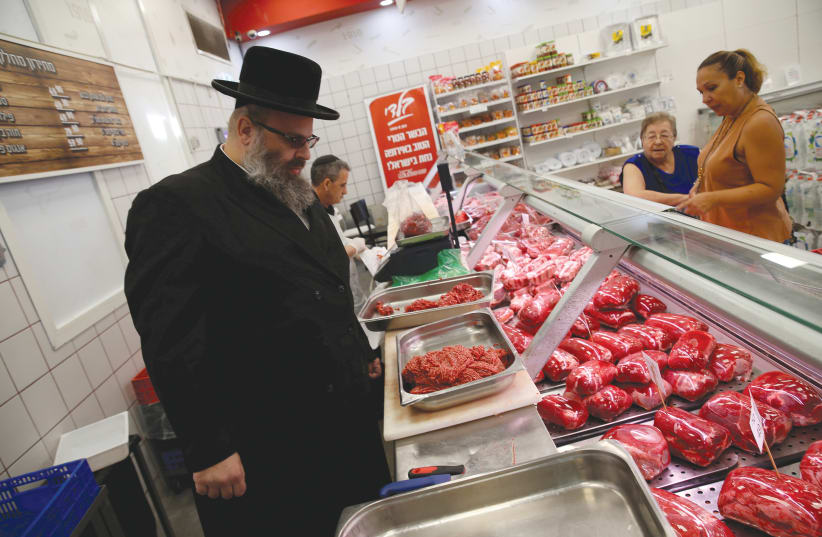In 1880, fully 88% of the world’s Jews lived in Europe. Today that stands at 9%, similar to what it was in 1170, during the days of Macbeth, according to a recent report by the London-based Institute for Jewish Policy research.
And even that number is likely to shrink further if a European Union Court of Justice decision last week upholding a ban on kosher and halal slaughter in two of Belgium’s three regions leads to moves to ban ritual slaughter in other EU states, where an estimated 790,000 of Europe’s 1.3 million Jews live (the rest live mainly in Russia, Ukraine and Britain).
Kosher and halal ritual slaughter, where animals are slaughtered before being stunned, is already banned in non-EU Iceland, Norway and Switzerland, as well as in EU-member states Sweden, Denmark and Slovenia.
What the court decided was that two of the three Belgian regions – Wallonia and Flanders, which includes Antwerp – could ban shechita (Jewish ritual slaughter). The Brussels-Capital region, which includes Brussels, has not passed this ban, so Jews in Antwerp can import steaks from Brussels (or Hungary or Poland). It is not as if kosher meat is banned in Flanders, or Wallonia, just that the ritual slaughter of the cows there is forbidden. Which means that if you want to eat kosher meat, it will have to be imported and that will significantly increase the price.
The message to Jews and Muslims in these regions is unmistakable: the rights of animals take precedence over the religious rights of humans. Flanders and Wallonia have said they are more interested in happy cows in their midst than happy Jews or Muslims.
According to foreign ministry officials, the ban on ritual slaughter was made possible through an unholy alliance between the far Left and Greens – who wave the flag of animal rights – and the far Right, who are interested in making Muslims feel uncomfortable. In Belgium, according to Israel’s ambassador, Emmanuel Nahshon, there are about one million Muslims and some 40,000 Jews among a population of about 11.5 million.
He tweeted the following after the court ruling: “This is a catastrophic decision, a blow to Jewish life in Europe. Apparently tolerance and diversity are empty words in the eyes of some Europeans...”
He tweeted the following after the court ruling: “This is a catastrophic decision, a blow to Jewish life in Europe. Apparently tolerance and diversity are empty words in the eyes of some Europeans...”
The Jews in Belgium are divided into two communities: Antwerp, where some 20,000 Jews live, about half of whom are haredim, and Brussels with another 20,000. While the community in Antwerp, which centers around the diamond industry, is either Haredi or largely traditional, the community in Brussels – which includes a not insignificant number of Jews working in the EU institutions there – is largely secular.
However, the Brussels Jewish community has also made it known that it, too, feels insulted by this restriction on Jewish life. There is also a growing concern that the next target will be circumcisions, with the far Right and the far Left again teaming up to ban that ritual: the far Left justifying it as concern for the welfare of the child, and the far Right, again, as seeing it as a way to curb Muslim immigration. A bill to ban circumcision is currently before the Danish parliament, and in 2018 a bill to ban it in Iceland was pulled following an international uproar.
Since the ban on the ritual slaughter of meat affects both Muslims and Jews, one might expect that there would be cooperation between the two communities in Belgium and throughout the EU to combat the measure, but that has not transpired.
Two reasons have been given for this: The first, is that the Jewish community does not necessarily want to be seen sharing a common cause with Muslims in political fights within the EU as it could rebound against them in certain countries – such as Hungary – where the Right is strong and there is a strong anti-Muslim sentiment.
A second reason for a paucity of cooperation between Jewish and Muslim groups on this issue is that Muslim organizations did not want to work with Jewish groups because of the Palestinian issue. The recent agreement between Israel and Morocco may, however, mitigate that factor – at least in Belgium – since the majority of the million Arabs in Belgium are from North Africa, more than 500,000 of them of Moroccan origin (primarily workers who came there in the 1960s).
If Morocco can cooperate with Israel, despite no agreement on the Palestinian issue, then certainly Moroccan expatriates should be able to cooperate with Jewish groups to stave off a threat to the religious liberties of both Muslims and Jews.
One way to do this would be to make clear at a political level that any party supporting this type of ban would suffer retribution at the voting booth by Muslim and Jewish voters.
It is not immediately clear whether the EU court decision will now be the green light that other EU countries were waiting for before instituting their own shechita bans.
It is unlikely, however, that large EU powers such as Germany and France – where shechita is already highly regulated – are likely to follow suit: In France, because such a move would face significant pushback form the country’s nearly half million Jews; and Germany, because the Germans want to see a Jewish community in their country since it assuages Holocaust guilt and shows, from their perspective, that bygones can be bygones, and it is possible for everyone to move on.
Germany now views its thriving and growing Jewish community as a badge of honor. Belgium, as the shechita ban clearly demonstrates, clearly does not.
